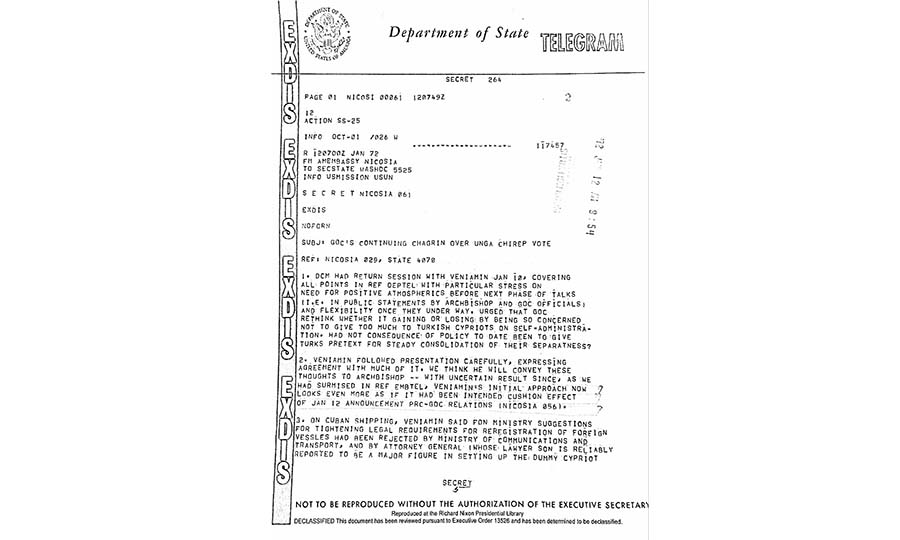

Opinion
By Andreas Hadjikyriakos
The release of secret documents, usually from the US and Britain, a few years later, sheds light on important moments in history. It also brings forth a lot of other information that's not well-known to the public. Researchers often stumble upon valuable details while searching for something else. These details can be valuable because they reveal the thoughts and actions of historical figures or because they are simply intriguing to history enthusiasts.
Today's story takes us back to the time of the Cold War between the United States and the President of Cyprus, Archbishop Makarios. It shows us the challenges he faced in maintaining his country's balance among the superpowers of the era.
In the summer of 1971, a diplomatic dispute erupted at the United Nations headquarters in New York over China's representation. At that time, China was not adequately represented in the international organization. In 1945, when the UN was established, China was under the rule of Chiang Kai-shek. However, in 1949, Mao Zedong's communists took over, forming the People's Republic of China. Taiwan, with the support of the United States, still held its place at the UN.

During that summer, a group of countries, primarily from the Eastern Bloc and the Non-aligned Group (of which Cyprus was a founding member), began the process of recognizing the People's Republic of China as the sole legitimate representative of China in the UN, and they sought to expel Chiang Kai-shek's regime. The United States strongly opposed this move.
The politically correct choice for Cyprus in this Cold War battle was to stay neutral. However, the pragmatic choice was to side with China, as it had the majority of support for the resolution. The United States sought Nicosia's assistance, and President Makarios pledged to support the US in the UN General Assembly vote. The reasons behind Makarios's decision remain unclear. Perhaps he saw it as an opportunity to improve his standing in Washington, where he had been called names like "the Mediterranean Castle" and "the Red Rosary" since 1964.
On October 25, 1971, Resolution 2578, recognizing the People's Republic of China as the sole representative of China and expelling Taiwan, was presented to the General Assembly. 76 countries voted in favor, 35 opposed, and 17 abstained. The United States found itself in a difficult position, as even its allies, like Britain and France, did not support its stance. Cyprus, in a surprising move, abstained instead of supporting the US, which infuriated the Americans. This decision strained US-Cyprus relations, and Ambassador Popper expressed his disappointment.

Makarios tried to mend the relationship with the US, but the damage had been done. The Americans wanted Spyros Kyprianou, the Cypriot Foreign Minister, removed from his position as a consequence of the abstention. However, Makarios couldn't do it immediately due to Kyprianou's health problems and fear of the stress leading to an impeachment.
The Americans were aware of Kyprianou's health condition but felt that Makarios was exaggerating. Benjamin, a US official, urged for suggestions on how to improve bilateral relations. Makarios seemed anxious about his relations with the US because he planned to establish diplomatic ties with China soon. He wanted to soften the impact of this decision by appearing cooperative with the US.
In the end, the Americans aimed to leverage Makarios's predicament. They requested two things: progress on the Cyprus issue and stricter controls on Cypriot-flagged ships used by Cuba to evade the US embargo. Nicosia promised to tighten regulations on ship registration but didn't follow through.
Makarios later sought Washington's help to prevent a coup planned by the Greek junta against him. In May 1972, he accepted Kyprianou's resignation. Five years later, Makarios passed away from a heart attack, and Kyprianou succeeded him as President for a decade.
Sources:
Telegram from the US Embassy in Nicosia to the Secretary of State, January 5, 1972.
Telegram from the US Embassy in Nicosia to the Secretary of State, January 6, 1972.
Telegram from the Secretary of State to the US Embassy in Nicosia, January 8, 1972.
Telegram from the US Embassy in Nicosia to the Minister of Foreign Affairs, January 12, 1972.
[This article was translated from its Greek original]
































